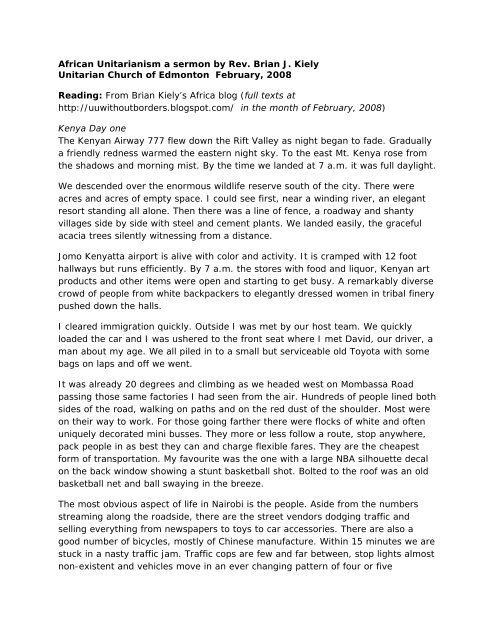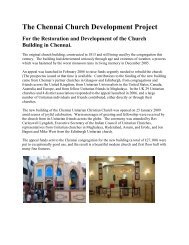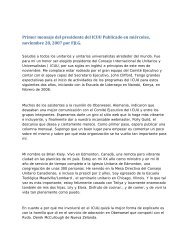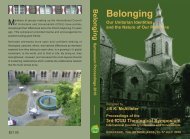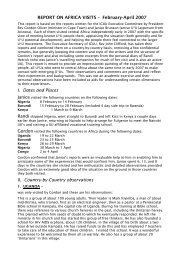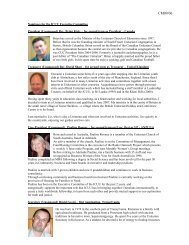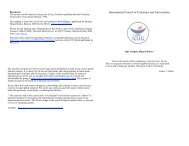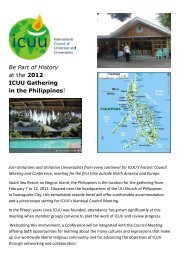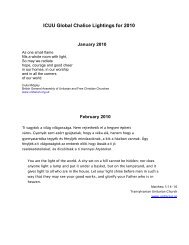African Unitarianism a sermon by Rev. Brian J. Kiely Unitarian ...
African Unitarianism a sermon by Rev. Brian J. Kiely Unitarian ...
African Unitarianism a sermon by Rev. Brian J. Kiely Unitarian ...
Create successful ePaper yourself
Turn your PDF publications into a flip-book with our unique Google optimized e-Paper software.
<strong>African</strong> <strong><strong>Unitarian</strong>ism</strong> a <strong>sermon</strong> <strong>by</strong> <strong>Rev</strong>. <strong>Brian</strong> J. <strong>Kiely</strong><br />
<strong>Unitarian</strong> Church of Edmonton February, 2008<br />
Reading: From <strong>Brian</strong> <strong>Kiely</strong>’s Africa blog (full texts at<br />
http://uuwithoutborders.blogspot.com/ in the month of February, 2008)<br />
Kenya Day one<br />
The Kenyan Airway 777 flew down the Rift Valley as night began to fade. Gradually<br />
a friendly redness warmed the eastern night sky. To the east Mt. Kenya rose from<br />
the shadows and morning mist. By the time we landed at 7 a.m. it was full daylight.<br />
We descended over the enormous wildlife reserve south of the city. There were<br />
acres and acres of empty space. I could see first, near a winding river, an elegant<br />
resort standing all alone. Then there was a line of fence, a roadway and shanty<br />
villages side <strong>by</strong> side with steel and cement plants. We landed easily, the graceful<br />
acacia trees silently witnessing from a distance.<br />
Jomo Kenyatta airport is alive with color and activity. It is cramped with 12 foot<br />
hallways but runs efficiently. By 7 a.m. the stores with food and liquor, Kenyan art<br />
products and other items were open and starting to get busy. A remarkably diverse<br />
crowd of people from white backpackers to elegantly dressed women in tribal finery<br />
pushed down the halls.<br />
I cleared immigration quickly. Outside I was met <strong>by</strong> our host team. We quickly<br />
loaded the car and I was ushered to the front seat where I met David, our driver, a<br />
man about my age. We all piled in to a small but serviceable old Toyota with some<br />
bags on laps and off we went.<br />
It was already 20 degrees and climbing as we headed west on Mombassa Road<br />
passing those same factories I had seen from the air. Hundreds of people lined both<br />
sides of the road, walking on paths and on the red dust of the shoulder. Most were<br />
on their way to work. For those going farther there were flocks of white and often<br />
uniquely decorated mini busses. They more or less follow a route, stop anywhere,<br />
pack people in as best they can and charge flexible fares. They are the cheapest<br />
form of transportation. My favourite was the one with a large NBA silhouette decal<br />
on the back window showing a stunt basketball shot. Bolted to the roof was an old<br />
basketball net and ball swaying in the breeze.<br />
The most obvious aspect of life in Nairobi is the people. Aside from the numbers<br />
streaming along the roadside, there are the street vendors dodging traffic and<br />
selling everything from newspapers to toys to car accessories. There are also a<br />
good number of bicycles, mostly of Chinese manufacture. Within 15 minutes we are<br />
stuck in a nasty traffic jam. Traffic cops are few and far between, stop lights almost<br />
non-existent and vehicles move in an ever changing pattern of four or five
imaginary lanes (some on dirt shoulders) with a mixture of courtesy and courage.<br />
Closer to the city center there are fruit stands and other mini-market shanties lining<br />
sections of the roadways. All kinds of architecture are evident, some old, some<br />
new, shanties here and there. It’s all jumbled together, but it doesn’t seem messy<br />
to me. It’s more a reflection of a people who are used to either going ahead on<br />
their own or just figuring out how to get <strong>by</strong> as best they can.<br />
I am getting to know David, since I am in the front seat. He patiently answers my<br />
questions, and asks many in return about global politics, Canada and a host of<br />
other topics. It’s a pleasant conversation, although everyone in the car has a lot to<br />
say about the upcoming American elections. They all like Obama with his Kenyan<br />
father.<br />
As we talk of Kenya’s recent violence, David says quietly, “It will be okay. We are a<br />
people used to many divisions. We talk about them. We know how to disagree and<br />
how to agree to disagree and still be friends. It will take time, but we will be okay.”<br />
Kenya Day eight<br />
A week later after the conference I joined Kevin Ragira and Shem Omwombo for an<br />
outing. We booked a taxi and headed east to Kitangela Estates where Kevin and<br />
his wife Divinah live. The 20 kilometre trip took nearly 90 minutes thanks to<br />
Nairobi’s amazing and endless traffic.<br />
To a westerner the word ‘Estate’ suggests something a little majestic and well to<br />
do. Kenyan Estates are, to privileged western eyes, anything but. This is an<br />
observation of difference and is not tinged with disrespect or even pity. In fact, I<br />
sense that Kenyans are happier in general than westerners. When everyone is poor,<br />
they don’t suffer from the material lust and ‘gotta have it’ that plagues the west.<br />
They do have real wants and needs (unlike me with only my imaginary ones), but<br />
beyond that they focus on family, friends and mutual support.<br />
Kevin’s house is off the main dirt road, down an alley, perhaps a dozen feet wide,<br />
each side lined with a solid wall of brick abodes. We push through the metal door<br />
into a meticulously clean and comfortable brick room. There are three sofas that<br />
double as beds spread on each of the other walls brightened with embroidered seat<br />
covers. This is Divinah’s handiwork.<br />
There is no cooking area, no washing area and no toilet or running water. There are<br />
just two rooms with a small window in each. Kevin extravagantly buys Fantas at the<br />
tiny store across the alley. He then goes and gets his sons, his nephews and a<br />
friend from school to bring them to meet me. The boys come tumbling through the
door. There are formal handshakes, a little conversation, many pictures and then<br />
off they run back to class.<br />
Kevin and Shem then take me into the other room hidden <strong>by</strong> a curtain. It is a bare<br />
cement cube for storage and work. There are two sewing machines. This is where<br />
Divinah works. They hope to find financing to start a home based clothing business.<br />
We discuss details and agree that as a first project they should make chalice cloths<br />
for me to sell in North America. It seems that the impossibly inaccessible sum of<br />
$200 US or so would get them started. I have read about micro-loans, but this is<br />
the first time I have come in touch with the reality of what one can do. I think we<br />
can make this work.<br />
I hope that we will find a way to connect UU’s from around the world in some way<br />
to help make these small subsistence dreams a reality. Nothing is set-up yet, but<br />
we’re working on it.<br />
I’ll close this blog this way: I know this journey has changed me, but for now the<br />
feelings, sensations and friendships are too fresh for me to venture a guess as to<br />
how that change will sort itself out. I do know it will be harder to dismiss the Third<br />
World as ‘them’ anymore. I do know I will pay attention when I hear the word<br />
‘Africa’ from now on. I am more convinced than ever that we in the West and the<br />
North will have to be prepared to make material sacrifices in order to bring<br />
economic justice to the world. It will not be enough to simply nod when politicians<br />
protecting national interests say that their economic policies will help the Third<br />
World and that rising economies will float all boats. Instead, I believe some real<br />
redistribution of wealth will have to occur.<br />
Asante<br />
<strong>Brian</strong><br />
Sermon:<br />
What did the Congolese totem worshiper, the Kenyan Seventh Day Adventist and<br />
the Burundian Roman Catholic seminarian say to one another as they sat down for<br />
tea??<br />
When did you become a <strong>Unitarian</strong>?<br />
I offer that rather sad attempt at humour to make a point that <strong><strong>Unitarian</strong>ism</strong> in<br />
Africa is anything but uniform in history and tradition. Africa is a place that before<br />
European colonization was a collection of very local cultures, tribes and economies.<br />
There had been a few empires over the centuries, but for the most part religion,
language, and government remained local. That history infuses the <strong>African</strong><br />
continent today. Wars are often tribally and ethnically charged as are politics,<br />
dress and culture. Improved transportation and the explosion of mobile phone<br />
accessibility have started to expand the worldview in many <strong>African</strong> countries,<br />
especially in the cities, but the ties of tradition are still strong. Faculty members<br />
began to see those differences at work among various groups of <strong>African</strong> <strong>Unitarian</strong>s<br />
at the first sessions of the International Council of <strong>Unitarian</strong>s and Universalists<br />
Leadership Conference in Nairobi in February, 2008.<br />
A couple of points of contrast were obvious. <strong><strong>Unitarian</strong>ism</strong> has been in South Africa<br />
since 1867 when a young Dutch Reformed minister turned his back on his church<br />
and preached the message of a loving – not wrathful- God. Our South <strong>African</strong><br />
congregations are also culturally Caucasian and European.<br />
The only other <strong>Unitarian</strong> group with historical roots is in Nigeria where the tradition<br />
dates from 1915. There, a black Anglican Bishop, a ‘liberal and principled man’<br />
pulled away and began holding services in Yoruba, using native instruments and<br />
writing Yoruba hymns.<br />
But <strong><strong>Unitarian</strong>ism</strong> in Burundi, Uganda, Congo and Kenya are pretty much brand new.<br />
In Bujumbura, Burundi, Fulgence Ndagijimana was a fallen away Catholic<br />
seminarian. He went to the World Wide Web and in 2003 found <strong><strong>Unitarian</strong>ism</strong>, made<br />
contact with an English minister, and on his advice gathered his own church. In a<br />
landlocked, utterly impoverished country, 15 years after a tribal war that paralleled<br />
the Rwandan genocide, it pays to be cautious with new and different things. Since<br />
2004, Fulgence has quietly gathered a community of 25 like-minded people. Their<br />
growth is limited <strong>by</strong> several factors, one of them being a lack of French worship and<br />
program resources.<br />
In English speaking Uganda, Mark Kiyamba also found us through the Internet.<br />
With no language barrier and relative peace in his nation, Mark has been able to<br />
gather a congregation of 150 in Kampala. But the Ugandan story is even more<br />
remarkable. Seeing a need, yet having no resources, no space, and no teachers,<br />
they just went ahead and started a congregation and school for AIDS children in<br />
the countryside. Right now they have 50 members and 450 students. It boggles<br />
the mind.<br />
Congo-Brazzaville is another French speaking country. Alaiin Yengue is an<br />
anthropologist. Unlike other <strong>African</strong> <strong>Unitarian</strong>s he did not come from a Christian<br />
background, but from an animist tradition of ancient tribal religion. In 2005, he was<br />
waiting for his brother to get off work in a Brazzaville hotel one day when he fell<br />
into a conversation with an American gentleman. They talked about religion and<br />
there Alaiin learned about <strong><strong>Unitarian</strong>ism</strong>. The man suggested that with our liberal<br />
views and our acceptance of paganism, it might be a bridge from the old world to
the new in Congo. Alaiin used the Internet (are we noticing a theme here?) and<br />
made connection with Jean-Claude Barbier the secretaire of the Assembleee<br />
fraternelle des Chetiens unitarianne in France. The group now meets regularly and<br />
is looking to grow.<br />
By far the fastest growing <strong>Unitarian</strong> community is in Kenya. In fact, it is four main<br />
communities, but all owe their discovery of <strong><strong>Unitarian</strong>ism</strong> to <strong>Rev</strong>. Patrick Magara.<br />
Patrick is our only ordained minister in Kenya, although his ordination came from<br />
the Seventh Day Adventist tradition. He discovered <strong><strong>Unitarian</strong>ism</strong> in 2001 and soon<br />
convinced his congregation to follow him into his new faith. How he discovered us<br />
and the why of his conversion is a little murky. Like most Kenyans, English is<br />
Patrick’s second, or perhaps third language. Sometimes this gets in the way of a<br />
meaningful conversation with him, but most of us who know him suspect that the<br />
language difficulties can sometimes be a convenience.<br />
“Why did you become a <strong>Unitarian</strong>” earns a discourse on <strong><strong>Unitarian</strong>ism</strong> rather than<br />
the answer requested. Other awkward questions are similarly turned aside. That<br />
makes ICUU leaders concerned. Certainly there are many requests for financial<br />
assistance coming from the Kenyan congregations. We can’t help but wonder.<br />
But we have to balance that suspicion against the very real need and the very real<br />
efforts he and his people have made to better the quality of life of his people, and<br />
the success he appears to have had in planting our liberal faith.<br />
It’s hard to pin down a firm number of <strong>Unitarian</strong>s in Kenya, but it is certainly over<br />
500 in four major groups. Five years ago there were none...Zero. They all learned<br />
our faith from him. Right now there is some tension between the more progressive<br />
and urbane groups and the more rural groups led firmly <strong>by</strong> Mr. Magara. They<br />
seemed to make progress in coming together at our conference, and the ICUU is<br />
help fund conversation and reconciliation efforts. We will have to wait and see.<br />
The growth is hard to ignore. Why so much growth so fast? Kenyan <strong>Unitarian</strong>s are<br />
willing to spread the word of their faith. Some preach in market places. Some talk<br />
to groups from other churches. There are many cases where entire congregations<br />
have ‘converted’ to <strong><strong>Unitarian</strong>ism</strong>. And then there is the outreach of their<br />
community social programs and schools. Anyone can participate, but the WILL<br />
hear about our faith. No one is forced to convert, but all who come in contact with<br />
Kenyan <strong>Unitarian</strong>s will learn something about us.<br />
Good heavens! Conversion? Proselytizing? <strong>Unitarian</strong>s doing that? Amazing!<br />
But here’s something worth thinking about: If their success continues, within a few<br />
years there will be more <strong>Unitarian</strong>s in Kenya than there are in Germany, Canada or<br />
the UK. Wow!
And then there are the longer term efforts on behalf of the community.<br />
Before the conference, Patrick kept inviting us to come to Kisii, a place close to the<br />
worst of January’s post-election violence. “No, no!” he would say, “Kisii is safe.” It<br />
was hard to believe. But then we arrived and learned that for years <strong>Rev</strong>. Magara<br />
and others have travelled around Kisii province speaking to people and groups in<br />
conflict. They are peace-makers. When the region went up in flames, that<br />
groundwork helped preserve the local peace. Kisii really was pretty safe.<br />
How to live our <strong>Unitarian</strong> Universalist faith into our daily lives is a challenge facing<br />
many in the developed world. We may tend to do constructive work to better<br />
society, but we seldom fly a church banner when we do so. In Kenya that<br />
separation of faith and living is literally unthinkable. Ask the Kenyan <strong>Unitarian</strong>s<br />
about their church and they won’t talk about worship or membership numbers.<br />
Instead they will tell you about their projects: the women’s groups, the working<br />
cooperatives, the AIDS orphanages, the volunteer-run schools. To be a <strong>Unitarian</strong><br />
there is to be involved in the community in a faithful way. Last week I mentioned<br />
Cyrus Itare. He is a young man in his 20’s. He and his wife have a one month old<br />
child. Cyrus is unemployed (not unusual around there and not a shameful thing.)<br />
He and his wife have taken in eight orphan children into their tiny home. I am in<br />
awe.<br />
Patrick’s wife Alice Magara is an inexhaustible bundle of energy and the closes thing<br />
I have seen to an irresistible force. She runs the Kisii women’s groups and plays a<br />
lead role in the AIDS orphans program. The word ‘No’ barely slows her down.<br />
Closer to Nairobi are two other groups, one in rural Ruai and one in the city. The<br />
Ruai group week in and week out feed 100 schoolchildren a hot lunch. And right<br />
now both groups are helping support some of the more than 400,000 people<br />
displaced <strong>by</strong> January’s violence.<br />
Let me stress something here. I am not personally feeling guilty nor am I trying to<br />
engender that in you. Nor do I think, are the <strong>African</strong> <strong>Unitarian</strong>s. They do what<br />
they do because their faith and their culture call them to do these acts of radical<br />
neighbourliness. They do it because in the face of the crises of AIDS, poverty, war<br />
and whatever else, it is impossible to remain aloof and distant. There is safety in<br />
neighbourliness, because the person you save today might save you next week or<br />
next month. And, of course, it’s the right thing to do. Sure, they ask us for help.<br />
Why shouldn’t they? We have money. They don’t. In their understanding of<br />
neighbourliness, this is not greed, it’s community.<br />
So <strong><strong>Unitarian</strong>ism</strong> in Africa is developing as a social and community based faith.<br />
Churches are more important for what they do than for what they think. Faith is a<br />
thing to be demonstrated in action. We in North America tend to think of our
church as a place where like-minded people come together to think and explore, to<br />
seek answers and find moral support. That is fine and noble and suited to our<br />
culture and our time. But to state the obvious, Africa is not Canada. <strong>African</strong><br />
<strong>Unitarian</strong>s expect their church to be a place ... Well, no, they don’t necessarily<br />
expect it to be a place. Church often happens under shady trees. They expect<br />
church to be a community where people tied <strong>by</strong> kinship, proximity and shared need<br />
come together to find strength, hope in prayer, work opportunities and practical<br />
support like food and clothing. The church needs to function as a social service<br />
agency first and as spiritual home second.<br />
It’s no surprise then that <strong>African</strong> UU ‘ministers’ are almost all lay leaders. The<br />
Kenyans have no training beyond that gleaned from monthly meetings with <strong>Rev</strong>.<br />
Magara. Leaders in other countries may have taken a course or two here and<br />
there, but nothing equivalent to a professional standard. Their need for education<br />
is high. That was the purpose of the Kenyan conference. Our job was to provide<br />
information and to open minds beyond the limits of local tradition and the village<br />
church.<br />
We began with definitions of religious terms. Many were surprised, for example,<br />
that there could be different ways of understanding words like ‘faith’, ‘god’ and<br />
even ‘religion’. One session covered <strong>Unitarian</strong> history and theology. Another<br />
explored conflict resolution. We held a discussion of worship practices that raised<br />
awareness of the immense variety in worship around the world and across Africa.<br />
My role was to discuss different kinds of church structure, locally and nationally.<br />
The programs were content-rich, but with a lot of room for discussion. The<br />
excellent and focused questions from participants suggested that they were hungry<br />
for such information.<br />
I did not speak for long. Instead I asked people to talk amongst themselves about<br />
how structure impacted their communities. And then we had an open conversation.<br />
That’s when it got very deep. Two main issues emerged. The first was the obvious<br />
struggle of social context. Wars, poverty, AIDS, these are the soil in which our<br />
religion is finding root. You have seen a little of how they approach these<br />
challenges.<br />
The second issue is also deeply felt. <strong><strong>Unitarian</strong>ism</strong> is a new kind of religious thought<br />
in most of Africa. But <strong>African</strong> is a collection of cultures where elders are revered<br />
and given and extraordinary amount of power. That’s quite different where<br />
democracy and the power of ideas hold sway. Perhaps half of the tension-laden<br />
conversation dealt with how to build something new in a place where ‘new’ is often<br />
resisted. It is a painful issue for the young ministers who are torn <strong>by</strong> their inbred<br />
respect for elders, and their passion for moving ahead with the new ideas<br />
associated with this bold religious adventure. For them it’s not just a matter of
making change. They must find loving answers for a difficult situation. Right now<br />
the ICUU is working to bring the various Kenyan groups together in a facilitated<br />
conversation. The goal is a unified national Kenyan UU organization.<br />
The best we could offer at the time was a North American analogy about the<br />
equality of women in our movement. In the 1970’s, UU women came together and<br />
in gentle ways and harsh, demanded their place at the table. That place was given<br />
grudgingly at first, but in time a new generation of ‘elder’ males grew up as<br />
supporters of women’s full equality, and the struggles eased. We suggested that<br />
the people in the room were the elders in training. When their time comes to<br />
assume that role, perhaps they will be the ones to share power.<br />
Well, these are preliminary observations from someone who has had a first and<br />
delicious taste of <strong>African</strong> <strong><strong>Unitarian</strong>ism</strong>. My own understanding barely scratches the<br />
surface, but I hope I have made a couple of things clear: <strong><strong>Unitarian</strong>ism</strong> in Africa is<br />
not a single thing. It is mostly a recent planting in several diverse soils. Some<br />
very interesting things are growing, but at best they are the shoots of a new<br />
religion. What, if anything, may be harvested decades from now is anyone’s guess.<br />
Second, <strong>African</strong> <strong><strong>Unitarian</strong>ism</strong> is not a postcard of smiling faces making the best of a<br />
hard world. There are conflicts over power and right interpretations of the faith,<br />
and conflicts over the use of scarce resources. But in that way, they are probably<br />
most like their North American counterparts. For now, they are like newcomers to<br />
our churches who love what they see, but who do not yet have a good grasp of the<br />
history and the issues that comprise the dimensions of our faith. But they bring<br />
excitement and a new way of doing things that will no doubt change the face of our<br />
faith in the decades to come.


